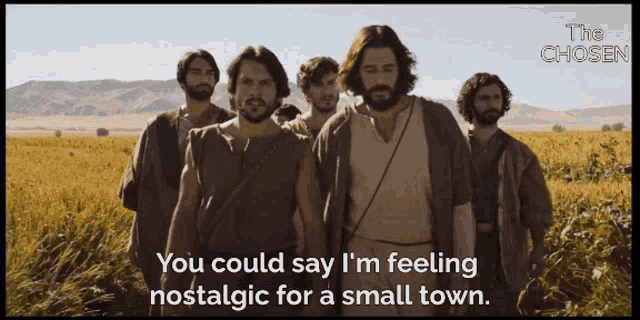At WALK THRU, we dive beneath the surface of scripture to uncover hidden gems that have been waiting for you all along. Whether you're a Bible Study valedictorian or just opening your Bible for the first time, I'm thrilled you're here as we discover the extraordinary within what others might skip past.
Three years ago, I left my home state behind for a new job opportunity. The farther I drove from familiar streets, family dinners, and lifelong friendships, the heavier my heart felt. Even today, my phone fills with social media updates from high school friends still gathering at our favorite hometown spots, relatives celebrating holidays without me, and memories that tug at my heart.
Sometimes during late-night video calls with family, I find myself wondering what would have happened if I'd stayed, if I'd chosen comfort over calling. But then I remember those three words that have sustained me: "Don't look back." I've learned that progress demands forward vision. Every time nostalgia threatens to become regret, I'm reminded of the biblical consequences of fixating on what God has called us to leave behind. That's exactly how I feel every time I read Genesis 19.
When fire and sulfur rain down on Sodom and Gomorrah, we're not just witnessing ancient catastrophe – we're encountering a sobering revelation about divine boundaries, human depravity, and the dangerous consequences of lingering in places God has marked for judgment.
The Descent into Darkness
Genesis 19 unfolds with the gravity of impending judgment. "The two angels arrived at Sodom in the evening, and Lot was sitting in the gateway of the city." This simple yet loaded observation sets the stage for everything that follows. The pattern is haunting:
Divine messengers arrive → Hospitality threatened → Violence escalates → Escape offered → Judgment falls
This isn't just storytelling – it's revealing something profound about the collision between divine holiness and human corruption. Each verse builds upon the previous one, creating an intricate portrayal of grace offered before judgment falls.
Breaking Down the Chapter
Verses 1-3: Angels arrive and Lot's hospitality
Verses 4-11: The mob's demands and supernatural protection
Verses 12-22: Warning, escape, and Lot's bargaining
Verses 23-29: Destruction falls and Lot's wife looks back
Verses 30-38: Aftermath in the cave
But here's what's unsettling – notice the deterioration? The chapter begins with angelic visitation and ends with incestuous conception. It moves from divine presence to complete moral disintegration, from offered salvation to the tragic origins of future enemies.
The Pillar of Salt Moment
When we reach the fate of Lot's wife, the text delivers its most piercing lesson. In a narrative rushing toward escape, the story freezes on one haunting image: "But Lot's wife looked back, and she became a pillar of salt" (Genesis 19:26).
This is devastating. In a single gesture of backward glance, we confront the danger of attachment to what God has condemned. She isn't just a cautionary footnote – she embodies the tragic consequence of divided loyalty. To escape judgment but long for what's under judgment is to remain spiritually trapped.
Why This Matters Today
Genesis 19 isn't just ancient catastrophe – it's a foundation for understanding:
Divine Boundaries: God distinguishes between righteousness and wickedness
Spiritual Urgency: Hesitation in moral decisions carries consequences
Intercessory Prayer: Abraham's earlier pleading (Chapter 18) shows mercy intertwined with judgment
Rescue Mission: God provides escape routes from destruction
Bible Trivia Challenge
Let's test your Bible knowledge with this fun fact from Genesis 19!
When the angels urged Lot to flee to the mountains, he was afraid and made a special request. He pointed to a small town nearby and asked to go there instead.
BIBLE TRIVIA QUESTION: What was the name of this tiny town, and what does the name actually mean?
A) Zoar - "Small" or "Insignificant"
B) Bela - "Consumed" or "Swallowed Up"
C) Admah - "Red Earth" or "Fortress"
D) Segor - "Gateway" or "Entrance"
BONUS CHALLENGE: What other significant Bible story involves someone asking God to spare a city, though with a very different outcome than Sodom?
Take your best guess before scrolling! . . . . .
If you chose A, congratulations Bible scholar! Lot begged to flee to Zoar instead of the mountains, saying "Look, this town is near enough to run to, and it is small. Let me escape to it—is it not a small place?" (Genesis 19:20)
The Hebrew word for "small" is "tso'ar" - and the town was actually renamed "Zoar" (which means "smallness" or "insignificance") because of Lot's description! Before this, it was called Bela (Genesis 14:2).
This fascinating detail reveals something profound about God's character. Even in the midst of executing judgment, God accommodates Lot's fear and grants his request for a "small favor" - sparing an entire town because one frightened man asked. This chapter shows us that God's mercy extends beyond what we might expect, creating space for human frailty even in moments of divine action.
Christ as our New Vision
Lot's wife looked back and was frozen in judgment, but in Christ, we are given a new vision that looks forward: "Forgetting what is behind and straining toward what is ahead, I press on toward the goal to win the prize" (Philippians 3:13-14). Jesus enables us to release our grip on what God has condemned.
When we accept Christ, our entire perspective shifts. Where Lot's wife was trapped by backward longing, Jesus redirects our gaze toward God's kingdom. Her pillar of salt represents arrested transformation, but in Christ, we are "being transformed into his image with ever-increasing glory" (2 Corinthians 3:18). The same eyes that once coveted what God rejected now see the superior worth of what He offers.
Lot's wife became an immobile monument to judgment, but in Christ, we become "living stones" (1 Peter 2:5) being built into a spiritual house. The salt that preserved her in death becomes in us the "salt of the covenant" (Leviticus 2:13) that preserves us for life. Christ transforms the very elements of judgment into instruments of grace.
In Christ, we experience a true exodus that Lot's family never fully achieved. They physically left Sodom, but emotionally remained bound to it. Jesus doesn't merely relocate us; He renews our desires. "If anyone is in Christ, the new creation has come: The old has gone, the new is here!" (2 Corinthians 5:17). The backward glance becomes unnecessary when what lies ahead is infinitely more satisfying.
Your Turn to Walk Through
As you read Genesis 19 again (and I encourage you to do so), consider:
Where are you potentially looking back at what God has called you to leave behind?
How does this chapter challenge your understanding of divine justice and mercy?
What are the "small compromises" that might be endangering your spiritual journey?
Remember, this isn't just ancient catastrophe – it's a revelation of divine character, a warning about lingering in condemned places, and an invitation to move decisively toward what God is offering rather than clinging to what He has rejected.
Join the Conversation
I'd love to hear your thoughts on Genesis 19 and how it speaks to your own journey. Share your insights, questions, or personal reflections below - this is a space where we can walk through scripture together.









